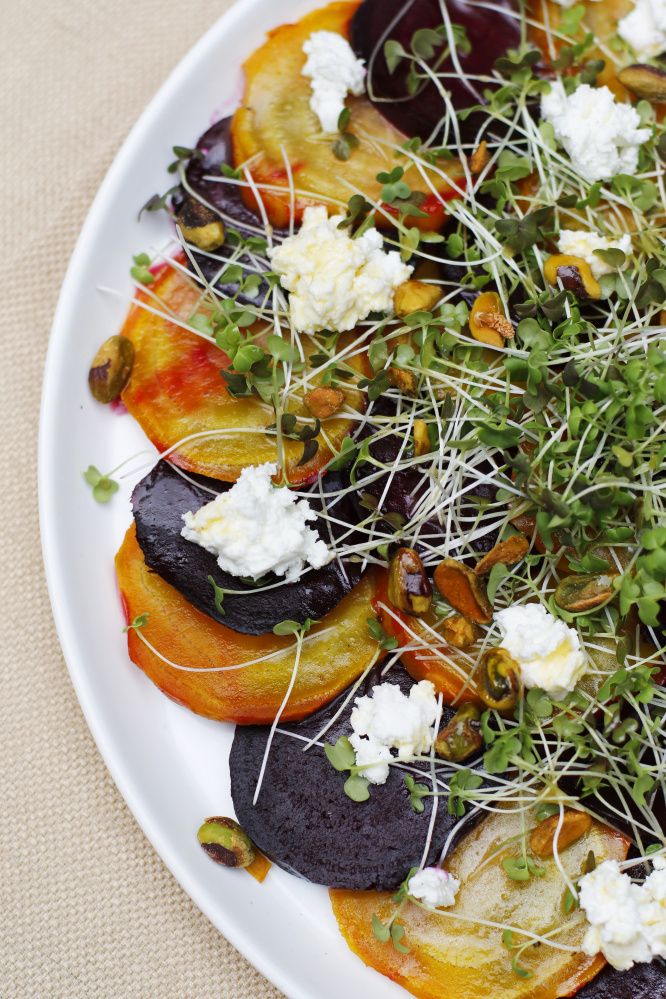So many things related to eating sustainably are just so darn severe. Avoiding pesticides by seeking out organics; making sure the fish you buy is underutilized, the beef is grass-fed, the pork is pastured and the chicken free range; calculating overall food miles and the carbon footprints of individual ingredients; avoiding excess packaging; buying into composting; and, of course, remembering your reusable bags before you’re in the checkout line.
Sometimes an eater just needs a little more whimsy and a little less earnestness. Take microgreens for instance. Aren’t they just as cute as kid goats, or what?
These tiny, vitamin-packed greens are produced by growing garden-variety vegetables in soil only to the point at which the embryonic cotyledon leaves and a pair of partially developed leaves reach up toward the light (between one and four weeks). At that point, they are cut and eaten. They differ from sprouts in that those are grown in water, in the dark, conditions that are also ripe for bacterial growth. Where sprouts are highly regulated for food safety issues, microgreens are not.
Chefs have been showering dishes with microgreens for over 15 years because of the bursts of color, flavor and texture they bring to the white-tablecloth dining experience. And now they are starting to crop up in farmers markets and specialty food stores around Maine for home cooks, too, to sprinkle over their weekly soups, salads, sandwiches and side dishes.
Most of the local chefs to whom Micromainea Micro Greens owner Judy Hughes of Westport Island sells her products prefer to buy single varieties of greens. She sells about 20 regularly, including arugula, Asian mustard suehlihung, fennel, garnet mustard, purple kohlrabi, red amaranth and sweet corn shoots and pea tendrils.
But Hughes is having the most fun creating, naming and taking requests for the microgreen mixes she sells at the Bath and Boothbay summer farmers markets. The “Real Men Eat Greens” mix sold around Father’s Day includes pepper crest, pea tendrils, fennel, arugula blossoms and purple kohlrabi. The more recent East Shore mix comprises arugula, pea tendrils, broccoli and purple radish.
Microgreens have a sustainable story for sure, says Hughes. She grows hers year-round (outside in the brighter months, inside under low-energy lights in the darker ones), in organic soil she sources from Living Acres in New Sharon, from non-GMO seeds from Johnny’s Selected Seeds in Winslow, without the use of pesticides.
She delivers her greens in recyclable (but not technically reusable) deli-type containers so they stay fresh. Hughes acknowledges that since the seed densities in her flats are higher than they would be if a farmer were planting them to produce the vegetable crop, and further, that since microgreens don’t typically go to seed, questions could be raised about the long-term sustainability of the seed supply.
“But I think of it as sustaining the livelihood of the seed growers, of supporting the community at large,” said Hughes, who is also planning to save some of the seed pods from the greens she allows to go to flower, to see if they can be cultivated into microgreens next year.
A second supplier of microgreens, Cultivation Works Farm in Saco – which markets them as Teenie Greenies – is an outgrowth of the Portland-based social services organization, Creative Work Systems, which provides supported employment opportunities for people with disabilities. According to Mary Jo Marquis, director of social enterprises at the agency, growing microgreens enhances employees’ skills both in terms of producing a quick, sustainable crop and practicing marketing talents as they also deliver the reusable flats of still-growing basil, carrot, celery, cilantro, kale and spicy mixed greens in organic soil to chefs from Portland to Kennebunkport. The outfit recently received a $15,000 grant to construct a greenhouse on the farm to produce enough Teenie Greenies to meet wholesale and retail demand.
Seems to be that everything about microgreens is growing fast.
Christine Burns Rudalevige is a food writer, a recipe developer and tester, and a cooking teacher in Brunswick. Contact her at: cburn1227@gmail.com.
Send questions/comments to the editors.



Success. Please wait for the page to reload. If the page does not reload within 5 seconds, please refresh the page.
Enter your email and password to access comments.
Hi, to comment on stories you must . This profile is in addition to your subscription and website login.
Already have a commenting profile? .
Invalid username/password.
Please check your email to confirm and complete your registration.
Only subscribers are eligible to post comments. Please subscribe or login first for digital access. Here’s why.
Use the form below to reset your password. When you've submitted your account email, we will send an email with a reset code.